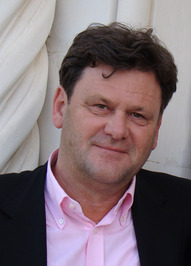Peter Seewald
Born
in Bochum, Germany
July 10, 1954

|
Salt of the Earth: The Church at the End of the Millennium - An Interview With Peter Seewald
by
—
published
1996
—
28 editions
|
|

|
Benedict XVI: A Life Volume One: Youth in Nazi Germany to the Second Vatican Council 1927–1965
|
|

|
God and the World: A Conversation with Peter Seewald
by
—
published
2002
—
16 editions
|
|

|
Benedict XVI: A Life Volume Two: Professor and Prefect to Pope and Pope Emeritus 1966–The Present
|
|

|
Benedict XVI: An Intimate Portrait
—
published
2005
—
9 editions
|
|

|
Benedicto XVI: Una vida
|
|

|
Jesus Christus die Biografie
—
published
2009
—
6 editions
|
|

|
Pope Benedict XVI: Servant of the Truth
—
published
2006
|
|

|
Wisdom from the Monastery: A Program of Spiritual Healing
by
—
published
2010
|
|

|
Los jardines de los monjes
by
—
published
2004
|
|
“Priesthood, Ratzinger stressed, meant getting out of a bourgeois lifestyle. It had to ‘guide people towards becoming reconciled, forgiving and forgetting, being tolerant and generous’. It was to help them ‘put up with other people in their otherness, and have patience with one another’. A priest must ‘above all, be able to support people in pain – in bodily suffering, as well as in all the disappointments, humiliations and fears, which no one is spared.’ For ‘the ability to accept and stand suffering’ is ‘a fundamental condition for successful human living. If that is not learned, then failure is inevitable.’16 The ‘right definition of what a priest should be and do’ was still Paul’s message in his letter to the Corinthians: ‘We are ambassadors for Christ.’ A priest is required ‘to know Jesus intimately; he has met him and learned to love him’. It was only by being a man of prayer that he was also a truly ‘spiritual’ person – a priest. When priests were overworked and felt tired and frustrated, it was often caused by a tense straining for performance. Then faith became a heavy burden, ‘when it should be wings to carry us’. Whoever works for Christ knows that ‘it is always someone else who sows and someone else who reaps. He does not have to continually question himself; he leaves the outcome to the Lord and does what he can without worrying, freely and happily, secure as part of the whole.’17”
― Benedict XVI: A Life Volume One: Youth in Nazi Germany to the Second Vatican Council 1927–1965
― Benedict XVI: A Life Volume One: Youth in Nazi Germany to the Second Vatican Council 1927–1965
“That ‘requires from you serenity of mind, fraternal harmony, moderation in proposals, dignity in discussion and sound advice’. John XXIII ended his speech with an”
― Benedict XVI: A Life Volume One: Youth in Nazi Germany to the Second Vatican Council 1927–1965
― Benedict XVI: A Life Volume One: Youth in Nazi Germany to the Second Vatican Council 1927–1965
“Unlike with all the previous Councils, this time there was ‘no particular problem to solve’. In a way, it was about the whole thing. ‘Christianity, which had built and shaped the West, seemed increasingly to be losing its defining power’, Joseph Ratzinger thought, as he witnessed the historic moment. ‘It seemed to have grown tired, and the future seemed to be determined by other spiritual forces.’5 It had to catch up with ‘the world of today so that it can again have power to shape tomorrow’.6 Pope John’s word aggiornamento – ‘updating’ – had mobilized a new energy. Everything should become fresher, newer, more vivid. But wasn’t it also clear that the Roman Curia with all its power – and all its guile – would undermine any attempt at reform? Didn’t the prepared schemata bear the stamp, in content, style and mentality, of precisely that Roman neo-scholastic theology which needed to be overcome? Yes, the entry into St Peter’s was impressive. But, Ratzinger wondered outside in the Square, ‘Is it normal that 2,500 bishops, not to mention the many other”
― Benedict XVI: A Life Volume One: Youth in Nazi Germany to the Second Vatican Council 1927–1965
― Benedict XVI: A Life Volume One: Youth in Nazi Germany to the Second Vatican Council 1927–1965
Topics Mentioning This Author
| topics | posts | views | last activity | |
|---|---|---|---|---|
| Book Nook Cafe: The Book Salon ~~ April 2021 | 221 | 53 | Apr 30, 2021 10:03AM |
Is this you? Let us know. If not, help out and invite Peter to Goodreads.






























